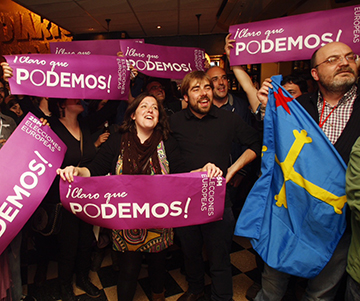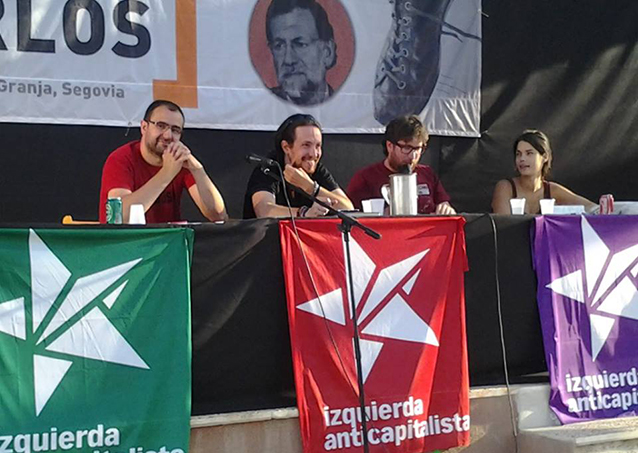by François Sabado
February 4, 2015
The following text is a transcription of a talk given last month by François Sabado, a member of the French New Anticapitalist Party, to the Congress of Izquierda Anticapitalista, a socialist organization in Spain that was a founding part of Podemos.
Greetings. We would like, first of all, to congratulate you for the intuition, the “flair,” the sense of initiative that you have had to build Podemos, from the beginning. This was not obvious: what would come out of such a combination, the friends of Pablo Iglesias, independents, and ourselves? The decision was not easy to take.

Podemos activists celebrate in Asturias.
You were able to take it, on the basis of your experience but also because you are supported by one of the qualities of our international current, a certain degree of sensitivity to the real movement. Sensitivity, which has been borne by a revolutionary Marxist, non-sectarian tradition that has been bequeathed to us by our older comrades, like comrade Daniel Pereyra, veteran Trotskyist, present at this rostrum and other comrades to whom you have paid tribute, like Miguel Romero. The young generations have also learned from other experiences, with their strong and weak points, in the construction of broad anti-capitalist parties.
Your experience, with that of Greece, is very important, because it imprints as positive a dynamic as possible to the political situation in your country, whereas the situation remains very difficult for the class struggle in the rest of Europe:
- The crisis of the capitalist system, which exploded in 2007-2008, has exacerbated the deep underlying trends of counter-neoliberal reforms which have gone on for more than 35 years without discontinuities. While here and there a Keynesian turn was predicted in response to the crisis, there were on the contrary more neoliberal capitalist attacks. This long period of neoliberal counter-reforms combined with capitalist globalization and the collapse of the USSR and the Soviet bloc have created, with the policies of the bureaucratic reformist leaderships, the conditions for a historic decline of the traditional workers’ movement. The social democratic and post-Stalinist parties have been frontally damaged, but the revolutionary left has not escaped this overall crisis.
- In this context, there is a thrust, in almost the whole of Europe, from the right, the ultra-right, and the extreme right.
- Then, yes, there is some social resistance to the policies of austerity, but these struggles have not reversed the course of these policies and especially they have not created a political translation which would have been embodied in a growth of organizations or currents of the social and workers’ movement.
There has been no political correspondence except in two countries: Greece with Syriza and Podemos in the Spanish state. This is what makes the generalization of the Greek and Spanish examples difficult, without taking anything away from their tactical and strategic importance in the fight against austerity policies in Europe. We cannot understand Podemos without the 15-M, the crisis of the post-Franco transition, and the collapse of the PSOE [A Spanish social democratic party–ed.]. You cannot understand Syriza without the 30 days of national strikes experienced by the Greek people and the fall of the Pasok. Once again, we cannot generalize these examples, but they indicate the potential for reorganization of the popular movement.
In your discussion, the characterisation of Podemos as “reformist” has been advanced. It should be clarified. Of course, there are reformist ideas in Podemos, borne in particular by its leadership: a tendency to the moderation of anti-crisis demands; a conception of the use of the state imported from the Chavista experience, that cannot work in a major developed capitalist country precisely because the state is in the service of the caste or more exactly of the dominant classes; a conception of the people which is substituted for classes and which, by its extensive nature, may lead to the conciliation of classes; and finally, the “personalist” conceptions of leadership of the movement defended by Pablo Iglesias.
But this is not the reformism of the bureaucratic apparatus of social democracy, the post-Stalinist parties or the trade union leadership. This reformism is not crystallized in the bureaucratic apparatus of the labour movement or by integration in the state apparatus. Things can change, but at this stage–a year after the creation of Podemos–it is important to grasp the specificity of this reformism.
This has two consequences:
- The first is that in these conditions, the dominant classes, the summits of the state apparatus cannot have confidence in Podemos and its leadership to control the situation;
- And the second is precisely that, despite all the systems of organization, the “Podemos” wave which has engulfed the country also prevents a tight control of the movement. Remember that Podemos has its roots in the 15-M, a libertarian social movement.
In this situation, not everything is written: there are uncertainties, possible bifurcations, open scenarios. In this framework, the major axis of your politics corresponds to the needs of the anti-capitalist and revolutionary struggle.
First, grasp well the current moment. Things are not settled. In Greece or Spain, the social democratic parties are considerably weakened, but things are not settled. The right remains strong and there will be all sorts of manoeuvres to prevent a victory of Podemos, from direct confrontation to all possible combinations of PSOE-PP national unity or pseudo-technocratic governments. First we must do everything to beat the right and the PSOE and ensure the victory of Podemos.
It is also necessary to deploy a radical democratic politics and give it a social content: anti-austerity demands like the dynamic in Greece for the rejection of the memoranda of the troika, the cancellation of the illegitimate debt, the implementation of a program that begins to meet the social needs of the population. It is not about defending the entire socialist program but choosing a few key demands which have a transitional dynamic starting from basic needs but posing the problem of a redistribution of wealth and a different organization of the economy, breaking with productivism, for example. This transitional approach should be realized practically by the defence of social rights: the increase of minimum wages and the defence of employment and public services. And this, to be consolidated, must lead to incursions into capitalist ownership, in particular the nationalization/socialization of the banks.
The same goes on the political and institutional level, we must advance the need for constituent processes breaking with the regime and ensuring the self-determination of the peoples of the Spanish state, especially in Catalonia. Here there is a divergence with the leadership of Podemos. This must be done, step by step–not in an incantatory or ultimatist manner. This must be done by respecting the experience, the level of mobilization and awareness of the popular classes. We must invent the words to talk of the struggle against austerity and the need to break with capitalism. Pablo Iglesias gave as a model of political communication the watchwords of the Bolsheviks: “Peace, land, freedom.” He is right, but it must be added for the sake of accuracy that these simple slogans had as their objective the mobilization of the peoples of Russia to overthrow the Tsarist state.
 Podemos leader Pablo Iglesias speaks at the fourth Izquierda Anticapitalista summer school.
Podemos leader Pablo Iglesias speaks at the fourth Izquierda Anticapitalista summer school.
Finally, one of the strong points of Syriza and Podemos is to ask a question of government and power. Up to now, Syriza has employed the formula of a “government of lefts.” Today the temptations are emerging among the leadership of Syriza to defend the proposal of a government of national unity. The left of Syriza is opposed to such a government. It sums up the formula of a “government of lefts” by giving it the content of a “Syriza-KKE-Antarsya” government applying an anti-austerity programme. If Syriza won, it will quickly be at the crossroads, it will have to choose between fidelity to the fight against austerity or concessions in the face of pressure from the troika.
Podemos wants to win and form a “Podemos government.” The question of content and program remains open. In these conditions, we must move advance the first elements of response for a “left government,” an anti-austerity government, which begins to apply anti-capitalist measures and registers a break with the regime. If there is a “Podemos” government, we will support all the positive measures and we will criticize those which do not correspond to the needs of the people, placing mobilization and social self-organization at the centre: “el poder popular.”
Many delegates have said “Somos Podemos,” and it is actually correct. We are militants of this movement that we have built since the beginning. Today you transform Izquierda Anticapitalista from a party to a movement. These are the rules adopted by Podemos. But to “make an anti-capitalist movement” does not mean a dissolution or dilution. You have defended for several decades a certain tradition, I am sure that you will continue. I am sure that you will continue to defend your ideas. “Making a movement” does not mean doing less politics; on the contrary, it is more politics, more exchange of experiences, more initiatives of debates to interact with activists of Podemos and the popular movement.
The state of mind that you have shown in this congress is to build Podemos while defending our ideas adapted to the reality of experience, of its militants. Finally, and this is on the basis of our history and other experiences of construction, there is a point to which you are going to face; it is the relationship between the construction of Podemos and Izquierda Anticapitalista as a popular movement, as well as the conquest of electoral positions. To advance our ideas, we must, of course, defend them before the people, and contest elections, at all levels, from the commune to the assemblies, but the elected representatives must use the institutions for the development of class struggle and, in your own construction, the tasks of intervention and popular implantation must remain our priorities.
To conclude, your experience like that of Greece is decisive: it is here where the chains of austerity can be broken. Please be aware that we will do everything to ensure your struggle enjoys international solidarity.
François Sabado is a member of the Executive Bureau of the Fourth International and an activist in the New Anticapitalist Party (NPA) in France. He was a long-time member of the National Leadership of the Revolutionary Communist League (LCR). This transcription was originally published on International Viewpoint.
